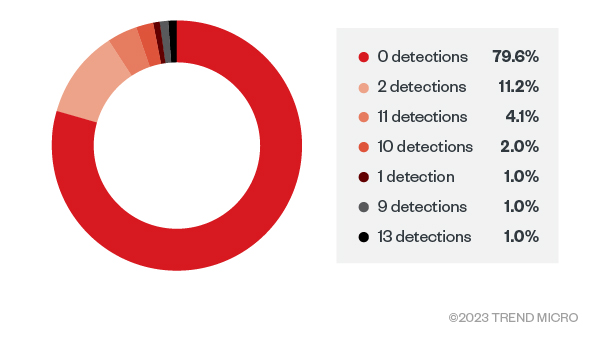UPDATE as of 6/15/2023 7:30PM (PHT): We've updated this entry to include indicators of compromise (IOCs) for BatCloak.
In our recent investigation, we discovered the use of heavily obfuscated batch files utilizing the advanced BatCloak engine to deploy various malware families at different instances. Running analysis and sample collection from September 2022 to June 2023, we found that these batch files are designed to be fully undetectable (FUD) and have demonstrated a remarkable ability to persistently evade security solutions. As a result, threat actors can load various malware families and exploits by leveraging highly obfuscated batch files seamlessly. Our initial research titled “The Dark Evolution: Advanced Malicious Actors Unveil Malware Modification Progression” delves into the continuing evolution of BatCloak, uncovering the modifications that have propelled modern malware to new levels of security evasion.
This is the first entry in a three-part technical research series taking an in-depth look at the continuing evolution of the highly evasive batch obfuscation engine BatCloak. The second part of this series, "SeroXen Incorporates Latest BatCloak Engine Iteration," will look into the remote access trojan (RAT) SeroXen, a piece of malware gaining popularity for its stealth and, in its latest iterations, targets gamers, enthusiast communities, and organizations. Aside from the RAT’s own tools, we will look into the updated BatCloak engine included as SeroXen’s loading mechanism. The third and last part of this series, "SeroXen Mechanisms: Exploring Distribution, Risks, and Impact," will detail the distribution mechanisms of SeroXen and BatCloak. We also include our security insights on the community and demographic impact of this level of sophistication when it comes to batch FUD obfuscation.
Defying detection: A preview of BatCloak engine’s efficacy
We analyzed hundreds of batch samples sourced from a public repository. The results showed a staggering 80% of the retrieved samples exhibiting zero detections from security solutions. This finding underscores the ability of BatCloak to evade traditional detection mechanisms employed by security providers. Moreover, when considering the overall sample set of 784, the average detection rate was less than one, emphasizing the challenging nature of identifying and mitigating threats associated with BatCloak-protected pieces of malware.

Understanding the evolving landscape of advanced malware techniques such as FUD obfuscator BatCloak enables us to develop more effective strategies for combating the ever-evolving threats posed by these sophisticated adversaries. These findings highlight the pressing need for enhanced approaches to malware detection and prevention, such as a cutting-edge multilayered defensive strategy and comprehensive security solutions.
Security teams and organizations are advised to exercise a zero-trust approach. Teams should implement solutions capable of combining multiple rules, filters, and analysis techniques, including data stacking and machine learning to address the need for precise detection, as these tools can analyze individual and dynamic file signatures and observe patterns via heuristics and behavioral analysis. When uncertain of intrusions, behaviors, and routines, assume compromise or breach immediately to isolate affected artifacts or tool chains. With a broader perspective and rapid response, an organization can address these and keep the rest of its systems protected. Multilayered technologies and solutions, such as Trend Micro XDR™️, efficiently monitor, detect, and block tiered threats and attacks, as well as their clones and modified versions.
Instead of marking the end of an infection or an attack prior to the target because of siloed solutions, an extended detection and response capability across endpoint, servers, workloads, email, network, cloud, and identity observed from a single platform like Trend Vision One™️ can mitigate these risks by considering adversarial tactics, techniques, and procedures (TTPs) to profile the entirety of a routine. Trend Vision One also correlates with a connected threat intelligence system and rapidly prioritizes and responds with the necessary security and defensive actions as far left of the routine as possible.
Download the first part of our analysis on BatCloak engine here, and the indicators of compromise (IOCs) here.

